
Trending Today

If you want to routinely win Legion games, you need to know how to “win the fight.” This is not the hip thing for most of the “content creators” (that term still makes me wince, even though it shouldn’t because it’s literally true) to talk about of course. There’s plenty out there about all this other stuff…list building…Turn 0…”Playing the objective” (yuck). Obviously, these things are incredibly important if you’re looking for reliable results, and that latter one is in fact the most important, but if I were to be brutally honest, I “win” most of the games I win because I win the fight. Are there some lists and situations where you can lose the fight but win the game? Of course there are, but a good player needs to be able to pivot to fighting when it’s necessary…and it often is.
I need to be careful here because I don’t want to give the wrong impression about these three things that I want to get out of the way up front so you understand my mode when you read this:
Attrition is another way to say it sure, but if you take for example one pair each of snipers that spend the whole game taking pot shots at each other and eventually one kills the other, the attrition matters a lot less than cornering and knocking out a heavy corps unit when it’s separated from the pack. Just as velocity is speed with a direction, “the fight” is attrition with purpose.
Men ought either to be indulged or utterly destroyed, for if you merely offend them they take vengeance, but if you injure them greatly they are unable to retaliate, so that the injury done to a man ought to be such that vengeance cannot be feared.
Niccolo Machiavelli
Yeah I know, real edge lord of me to quote this guy, but it’s a point that’s well made in a succinct way and credit where credit it due. Of course, this was articulated way before him by Sun Tzu and whoever taught Sun Tzu and so on. I mainly wanted to give you a good quote to alienate you at parties if you didn’t already know it, you’re so very welcome! In this particular case, I would nudge the word “indulge” to “avoid” since Legion is (unfortunately) not a friendly (LMAO) game of Diplomacy™.

You know he would have been playing Dark Troopers at Worlds
Now let’s get back to Legion, here are the principles I stick to when I’m trying to win a fight
Of course, you may know all this, but still often and even usually find yourself losing fights. Take a moment to remind yourself that missing this part of the picture doesn’t make you a “bad player” but it does mean you’re probably making big important mistakes. With that said, there is one concept where I personally see mistakes more often than any other, mistakes that quickly won me games when my opponent made them significantly more often than me.
Bear with me because we’re going to pretend that some variables are non-existent to illustrate a point.
In a game where “the fight” has started you can pick any unit and draw a Range X+Y bubble around its leader where X is your quality attack range (meaning I don’t count a single stormtrooper DLT, which will rarely get through heavy cover, but I would count a rebel DLT which has Critical 1 and one more dice) and Y is the extra distance you’d get from a full speed move (which is frustratingly never actually equal to one range band but you can usually eyeball it, especially when it’s a speed 2 standard trooper base that is close to but not quite 6″). This speed plus full speed movement in any direction is your “threat bubble.”

An example of a threat bubble that is 24″ long (range 4), this is basically five stormtrooper units against two and a half rebel troopers. The Empire player would be in very good shape as those two Rebel troopers on the side can’t participate next round unless the Empire moves closer.
Now then, keep your eye on that friendly unit and now look at AAAAALL your friends and foes that are inside that threat bubble. I’ve realized I’ve never had a real term for this but I’ll call it a micro-battle. For example, if you have five stormtroopers with T-21’s and full health that are all within range 4 (a move plus a shoot) of three rebel troopers with Z6’s, that’s an example of a micro-battle. On the other side of the board, an Imperial speeder bike may be hunting down a lone rebel strike team, that would be another micro-battle. The Rebel player may well have some more units than that on the battlefield, but if they’re spread out and not really participating in either of those micro-battles, then their offense and health is not going to contribute to them.
Consider the above examples. They’re both very much a problem for the Rebel player, and the math would suggest that the Imperial player will win both of those. While it’s naturally true that this doesn’t make it impossible for the Rebel player to win by sneaking away with three boxes or what have you, it certainly makes it harder for that player. If both players are acting rationally, they will be at the same time pursuing situations where they will have advantages in micro-battles, and avoiding those that would put them in a disadvantage in micro-battles. Sometimes, that means just getting the hell away, which is ok if it serves your overall game plan (and it often does, particularly for Rebel lists that aren’t great at standing and fighting).
When you’re mostly focusing on a ranged fight, you need to be thinking ahead in terms of how your moves before engagement will effect your positioning when engagement starts. Below you’ll see a scenario where the Imperial player made optimal moves with their stormtroopers while the Rebel player made some mistakes with moves and deployment that allowed them to be in that position. These pictures are meant to demonstrate the moves without objectives or terrain around to distract, obviously a real game has a lot more going on.
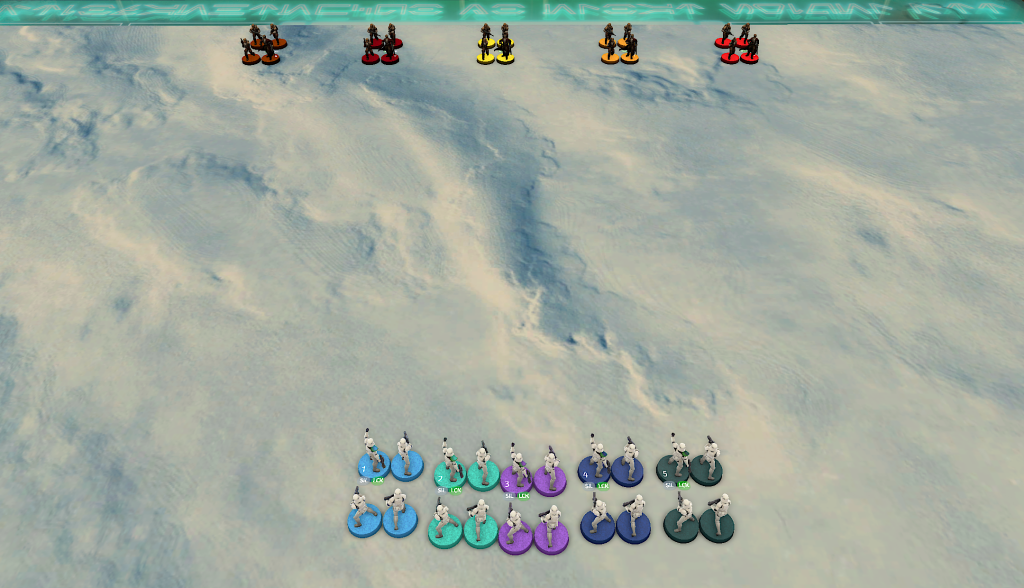
The Rebel player made themselves vulnerable at the beginning by deploying too spread out
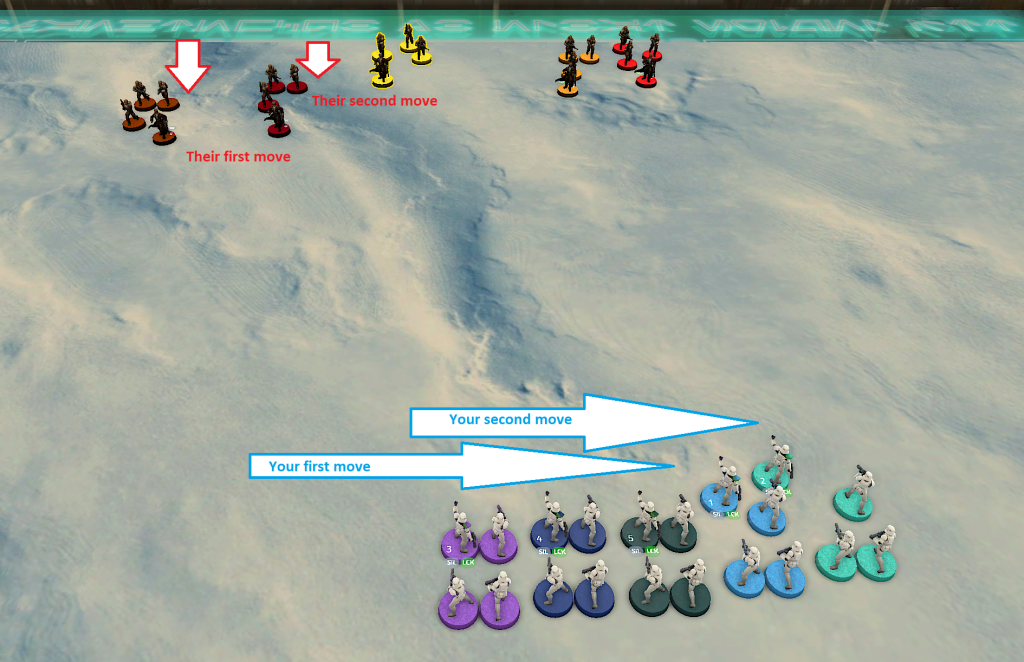
Let’s say you’re the Empire player, your opponent STARTED with their units that are LEAST threatened and moved them somewhat conservatively. This will be doubly painful for them later since it will be key to allowing a bad mismatch to happen
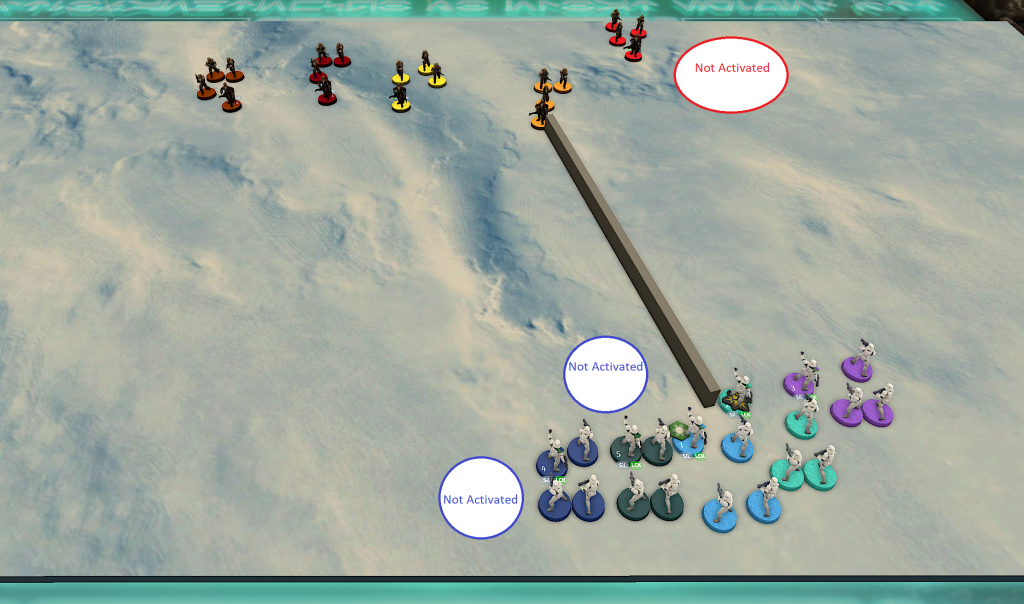
This is what things may look like after the first shot happened, you moved Light Blue and Purple twice to get them from your weak flank to your strong flank, much more useful than move-shooting and getting return fire. The middle blue unit did a single move and a dodge but could also have double moved further to the side. The rebels have made the first shot with Orange, which didn’t have an effect.
Notice the range ruler. I often will leave it out while I’m moving my units so I know where the EDGE of whatever range I want to be at is. This is a game of millimeters, and with shooters it’s often best if they are literally only as close as they need to be to their target at any given time. This reduces your opponent’s ability to manipulate threat bubbles later.
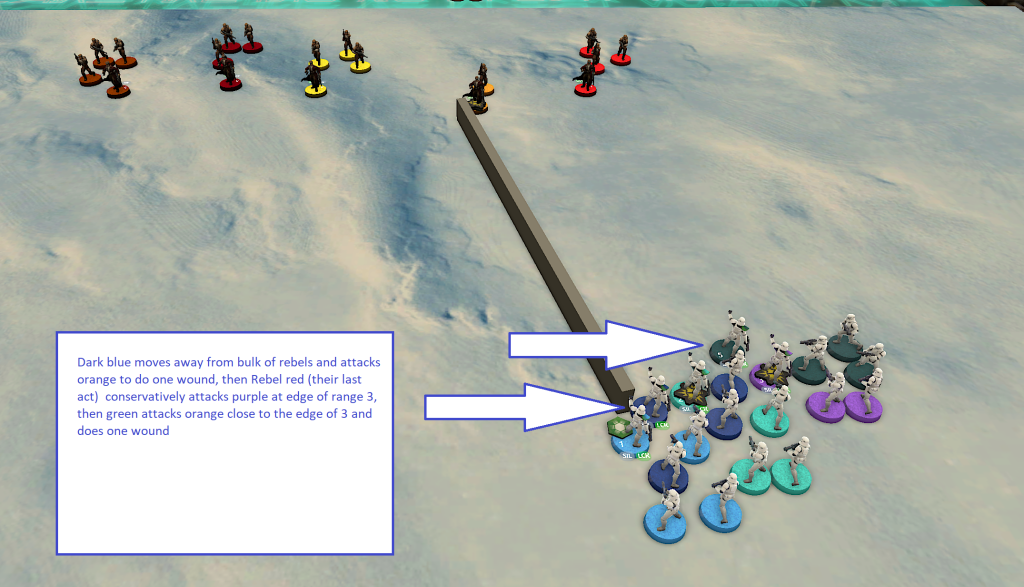
And thus you can see how the threat bubble farther up the page came to exist.
Again, I know this isn’t very reflective of actual play given the lack of delay and quite poor decisions of the Rebel player, but I hope you can see the general idea: THINK AHEAD, AND REMEMBER THAT SOMETIMES (often) MOVING TO MAKE A FUTURE MICRO-BATTLE BETTER IS SUPERIOR TO SHOOTING RIGHT NOW.
The above also demonstrates how moving as a big blob is often better than moving as a bunch of little blobs. If Legion was a very different (more boring) game where it was all about just shooting at each other with regular trooper gunlines, everyone would ALWAYS move as big blobs because that’s what optimizes your threat bubbles. Legion is thankfully not that game, but in many situations moving as a blob is still to your advantage when you purely are going for attrition. Clones naturally get a double bonus from this, but even without token sharing you will make it so that your opponent will have trouble exposing a weak flank…because you won’t really have one.
One way to manipulate the micro-battle is to get it away from the realm of pure contests of ranged attacks. This Wookiee squad below will be at a big disadvantage if it just started shooting at these B1’s at range 2’s, if none of the units pictured have activated yet, what should the Wookiees do?
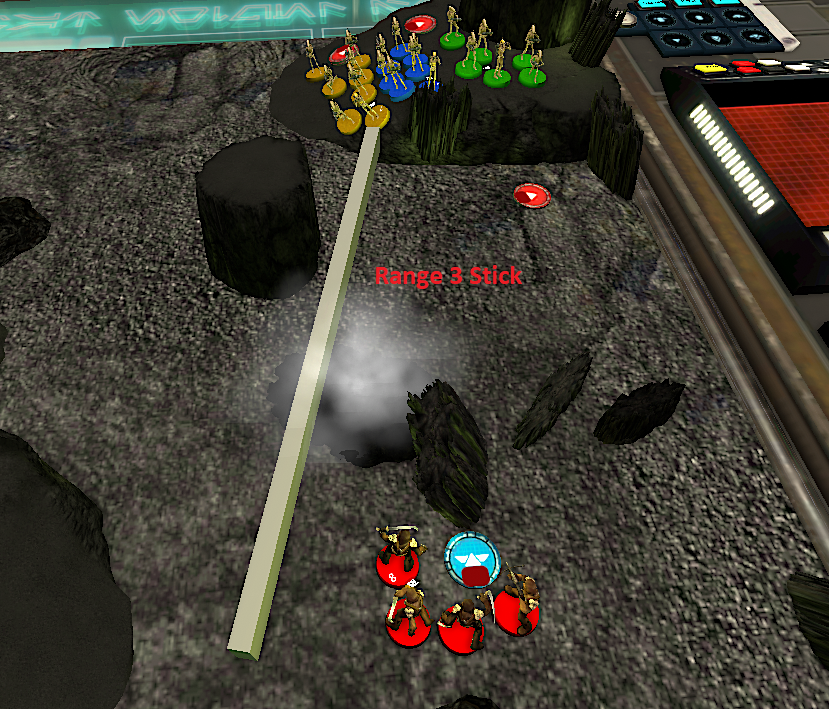
Basically, they could do a move shoot to get closer and still be in range to engage them next turn, or they could double move into LOS blocking. The answer here is really based on what actions are going to give you the advantage when it comes to the micro battle, since melee engagements shut out all of the shooters from the outside from helping their buddies out.

You chose to do a move shoot, then got shot three times. You killed 3 B1 minis and took 4 wounds on your Wookiees. This is a bad exchange for the Wook player, it was not worth taking the shot.

Instead, the Wookiee player can double move into LOS, forcing the droid player to contort his positioning to get a couple crappy shots, doing less damage.

And hey look there, next round the Wook player is able to get in there!
The lesson is the same as in the ranged one. Think ahead, and balance patience with aggression in a way that minimizes your exposure to bad micro-battles while maximizing your exposure to good ones. The scenario above would naturally have been different if all the droids had already activated and for some reason didn’t have standby tokens, in that case the Wook player could safely take a range 2 shot and still be ready to move in for melee the next turn.
It goes without saying that there are all sorts of variables that go into the calculation you make about whether or not to engage with such as cover, face-up tokens that are out, line-of-sight blockers, particular keywords that are meaningful to some but not all of your units (such as Impact or Suppressive) and way too many more to get into it with one article. One thing that I’ll close with is to remind everyone that making the right decision along these lines early tends to matter more than doing it later. This is because of the snowball effect. Forcing a mismatch early on to get rid of a unit close to the beginning of the game can have very significant consequences such as:
Learning how to win the fight is reflective of perhaps the most important general skill in Legion: thinking more than one turn ahead when you deploy, choose your battle cards, and choose your actions. Performing all these steps in a way that allows you to attack your opponent’s weak points with your own strong points, and protect your weak points from their strong points, will make you that much more likely to win games.
Do you think I’m a LOSER for writing this? First of all, how dare you, but second of all, I’d love to hear your thoughts in the comments below or on Facebook, I try to respond and stay active with those of you who continue to risk your valuable time by reading my stuff…but I thank you for it.
Copyright © 2024 The Fifth Trooper. All Rights Reserved.
2 Responses
This is the kind of legion article i’ve been dying for. These are the kind of ethereal thoughts one has while playing that are very difficult to articulate but are so crucial to how each game plays out. I’d love to hear more about melee tactics and how to run skew lists.
Great Article. My first call to any wargame is knowing the rules, this means that those decision trees become so much more predictable. There is no harm in playing out your moves on a table as a solo game. Play the scenarios, measure up the moves it takes to do X etc.